
Arquivo para a ‘Sem categoria’ Categoria
Empirismo é racionalismo ?
Seguindo nosso autor-guia Peter Kreeft, em seu imaginário diálogo de Sócrates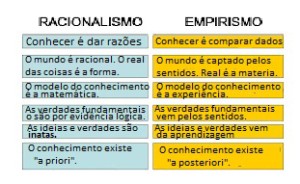 com Hume, agora Sócrates perguntará sobre o método e o que é verdade para Hume, tentando mostra-lo como racionalista, ao Hume afirma que não o é, Sócrates responde:
com Hume, agora Sócrates perguntará sobre o método e o que é verdade para Hume, tentando mostra-lo como racionalista, ao Hume afirma que não o é, Sócrates responde:
“SÓCRATES: Em sua teoria epistemológica, sim, mas não em seu método. O teu método, assim como o deles, consiste em reduzir ou dados à explicação, o complexo ao simples, a rica variedade da experiência às simples fórmulas universais.
HUME: Mas esse é simplesmente um dos elementos do método científico.
SÓCRATES: E isto significa que deva ser um dos elementos do método filosófico ?
HUME: Não há nada de absolutamente verdadeiro, ou falso, com relação a um método … um método é apenas uma ferramenta, um meio prático no fim de se encontrar a verdade. O que deveríamos debater é a verdade.
SÓCRATES: Concordo. Mas não pode ser a verdade que o método científico não é mais adequado para o filósofo que um método não científico para um cientista?
HUME: E que método usarias para comparar o método científico a qualquer outro método?
SÓCRATES: Eu usaria o método universal da lógica.
HUME: É justo.
SÓCRATES: E digo que o reducionismo viola as leis da lógica.” (Kreeft, 2014, p. 34)
O reducionismo é a base do racionalismo e também do empirismo, isto é a simplificação da realidade em fórmulas e processos aparentemente explicados, mas que são complexos.
O tema é anterior a modernidade, no final da idade média, o nominalista inglês William Ockham criou o método: “entre duas explicações escolha a mais simples”, e por causa dele isto ficou conhecido como Navalha de Ockham.
Mais tarde veio o racionalismo
No capítulo O ponto de partida (continuando o livro de Peter Kreeft), Sócrates começa a dialogar com Hume,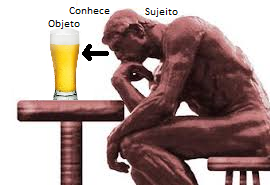 parte da premissa que há uma ruptura com a vida no pensamento do empirista e que no fundo é racionalista.
parte da premissa que há uma ruptura com a vida no pensamento do empirista e que no fundo é racionalista.
Explicando, é Descartes que funda o pensamento racional moderno com a ideia de que tudo pode ser explicado pela razão, mas há nela uma relação essencial com a física e o logicismo matemático, Hume tenta consertar isto colocando junto a experiência, mas seu empirismo não é exatamente a “vida” e Kant tentará mais tarde ainda conciliar os dois com seu idealismo.
Voltando ao roteiro de Peter Kreeft, que faz um hipotético diálogo de Sócrates com Hume, no ponto de partida, afirma Sócrates a Hume: “A tua divisão de Descartes entre a mente e o corpo: é definida e clara e é mais racionalista que experimental. Quase nenhum filósofo jamais apresentou tamanha lacuna entre sua filosofia e sua vida.” (Kreeft, 2014, pag. 31).
E iniciam o diálogo dizendo que Hume é ”um Racionalista disfarçado de Empirista”:
“HUME: Então, já que ainda não pretendes julgar minha filosofia, não pretendo julgar o teu julgamento … (segue)
SÓCRATES: … minha suspeita que és um Racionalista, a qual advém do outro ponto principal da primeira seção do seu livro … nos dizes o que pretendes realizar com tua filosofia
Mas não nos será lícito esperar que a filosofia, cultivada com esmero […], possa […] revelar, pelo menos até certo ponto, os móveis e princípios ocultos que impulsionam a mente humana em suas ações? Os astrônomos por muito tempo se contentaram em deduzir dos fenômenos visíveis os verdadeiros movimento, a ordem e a magnitude dos corpos celestes, … (segue) … [citando David Hume Investigações sobre o Entendimento Humano].
Aqui, para explicar o que a tua ciência das ideias pretende alcançar, fazer uma analogia com Newton: assim como ele reduziu os fenômenos complexos do comportamento de toda a matéria a uns princípios exploratórios, também reduzes … os fenômenos complexos de toda consciência a uns poucos princípios exploratórios. E isso também se parece mais com um ideal Racionalista do que um Empirista” (Kreeft, 2014, pags. 31 e 32).
Gotas de Filosofia: no início era Sócrates
Conhecemos Sócrates por Platão, isto é aparece nos diálogos da Platão e como
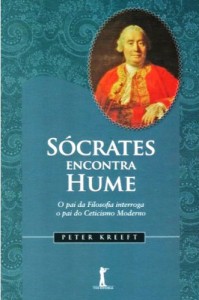 boa filosofia, é uma conversa na qual um raciocínio vai sendo engendrado em uma lógica como afirmava Leibniz: na qual uma verdade leva a outra, e assim alguém se contradiz ou é refutado no meio da conversa, enfim são diálogos.
boa filosofia, é uma conversa na qual um raciocínio vai sendo engendrado em uma lógica como afirmava Leibniz: na qual uma verdade leva a outra, e assim alguém se contradiz ou é refutado no meio da conversa, enfim são diálogos.
Diálogos não são aforismas, máximas que ditas de maneira quase dogmáticas podem parecer verdades, mas não são pela falta de diálogo, no dizer da filosofia de hoje, sem a presença do Outro, mas apenas a presença do Mesmo, monólogos por vezes autorreferentes ou sistêmicos, conforme o Paradoxo de Gödel: nenhuma teoria axiomática (lógica) é completa.
O debate entre Sócrates e Hume, embora um hipotético encontro na eternidade é importante, porque o empirismo foi a última grande corrente do pensamento científico, emprestada ao Círculo de Viena, que tentou reconceitualizar o empirismo e demonstrar as falsidades da metafísica.
Foi Peter Kreeft (2014) que escreveu “Sócrates encontra Hume: O pai da Filosofia interroga o pai do Ceticismo Moderno”, que humildemente escreve em sua introdução: “acredito não ter violado a integridade da filosofia de Hume” (Kreeft, 2014, p. 12) e depois: “Este não é um trabalho acadêmico” (idem), ao que diria: melhor assim.
Após uma apresentação inicial, em que Hume se diz como um cético e Sócrates não, mas se encontram como censurados pela academia, e fazem um diálogo sobre critica a ideias.
Destaco inicialmente, sobre esta questão da crítica que Sócrates diz ser importante ao ensino.
“SÓCRATES: Portanto, não reclamarás de estar sujeito ao mesmo tipo de crítica.
HUME: Não tenho nada a temer. Não sou um desses construtores de sistemas dogmáticos, como aqueles Racionalistas, Descartes, Espinoza e Leibniz.
SÓCRATES: Isso ainda veremos.” (Kreeft, 2014 pag. 17)
KREEFT, Peter. Sócrates encontra Hume: O pai da Filosofia interroga o pai do Ceticismo Moderno, Campinas: CEDET, 2014.
Ainda coalizão: o diálogo como cinismo
 Quando se esperava um governo de “notáveis” que pudesse redirecionar a política nacional, assistimos a uma continuidade onde até mesmo alguns ministros que ontem eram do governo anterior, e agora serão ministro de Temer.
Quando se esperava um governo de “notáveis” que pudesse redirecionar a política nacional, assistimos a uma continuidade onde até mesmo alguns ministros que ontem eram do governo anterior, e agora serão ministro de Temer.
Um dos grandes nomes da filosofia contemporânea, Peter Sloterdijk (1947) divide em duas cenas a filosofia do ocidente, aplicáveis aos fatos do Brasil de hoje: cinismo descrito em seu profundo e de difícil leitura Crítica da Razão Cínica (1983) e ira em um livro mais recente Ira e Tempo (2006), lançado recentemente no brasil pela Estação Liberdade, e já está no prelo na mesma editora três volumes de Esferas, considerada já sua obra magna.
O cinismo onde recupera o seu sentido antigo (kynismos) e sua troca para um sentido moderno, que significa uma “troca de lado”, que aplicável ao momento atual no cenário brasileiro significa uma lógica “dos senhores”, que ele divide em 4 seções: fisionômica, fenomenológica, lógica e história, que desvela como construiu-se o pensamento moderno.
Usando a literatura que vai de Fausto a Heidegger, sua análise fenomenológica fecha com a anatomia do República de Weimar, raiz para ele dos “totalitarismo” ao menos do ocidente.
O cinismo é uma “divisão de consciência”, que confunde autonomia e alienação, em três formas bastante claras: a mentira, a ilusão e a ideologia. Foi assim, para o filósofo, que ideal do Esclarecimento estagnou-se numa crítica ideológica da sociedade, e com a qual fez seu pacto silencioso.
Com o problema universal, uma espécie de bolha do cinismo a única arma que nos teria restado seria a Ira, mas não é, há também um herói entre o inimigo e uma substância sutil fora do mundo (vale aqui lembrar o conceito de substância em Espinosa e Leibniz), fazendo uma curiosa transcendência da ira, para ele Deus, para nós um deus hegeliano.
Como esse deus-ira pode fazer uma interface divino-humana ? ele cria um conceito chamado thymos, uma espécie de conflito interior da consciência heroica que leva a violência.
Esta “revolução timótica”, leva-nos a investir em auto-estima, guerras coletivas de reconhecimento, e ideologia e pseudo-políticas sociais podem mobilizar estas iras.
PLT – Tecnologia para Literacia de Pessoas
Ao pé da letra, seria Tecnologia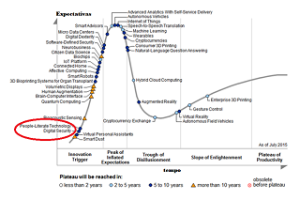 para “iniciação” de Pessoas (People-Literacy Technology, em inglês), o que daria em português TAP, mas não sei se vão adotar exatamente isto.
para “iniciação” de Pessoas (People-Literacy Technology, em inglês), o que daria em português TAP, mas não sei se vão adotar exatamente isto.
O certo é que pela primeira vez isto apareceu no famoso hipociclo de Gartner, iniciando a curva de expectativas.
Uma das coisas importantes de saber o ponto que uma determinada tecnologia está numa curva de hipoclico é entender o que significa exatamente “literacia” (ou aprendizagem) em determinada época conforme expectativa e a maturidade dentro daquela curva, por exemplo, até o início dos anos 1990 não significava nada a Web, os celulares eram grandes demais para o bolso, o Google só apareceu em 1998 e justamente neste período um sistema de metadados chamado Dublin Core estava aparecendo, até 2003 não havia o MySpace e o Youtube foi lançado somente dois anos depois disto.
Assim, ferramentas são criadas, desenvolvidas e trabalhadas conforme a época, em 1995 era básico trabalhar com processamento de texto e folhas de cálculo, mas hoje há ferramentas mais sofisticadas e planilhas já elaboradas onde basta você saber quais são os campos a serem preenchidos, os processadores de textos tem ferramentas de correção, de comentários personalizadas e até mesmo vocabulários próprios para determinados contextos.
Definir “literacia” ou aprendizagem digital significa agora, uma vez que entrou na curva de hipociclo de Gartner (no ano de 2015) algo designado como PLT (People-Literate Tecnology), o que significa uma definição mais rica e complexa sobre literacia, por exemplo, a Universidade do Colorado definiu colocando diversos tópicos a serem considerados nesta complexidade: Comunicar, Resolver problemas, Acessar, gerenciar, integrar, avaliar, projetar e criar informações para melhorar a aprendizagem em todas as áreas, e, finalmente, adquirir conhecimentos ao longo da vida e as habilidades do século 21.
Note-se que dois itens referem-se a Comunicação e Informação, um outro a resolver problemas e um quarto ao que significa adquirir conhecimentos no século 21.
Claro que “literacia” já é um termo recorrente no meio da cultura digital, mas agora trata-se de “tecnologia” de auxilio a literacia.
O Brasil redescoberto Grandes sertões: Veredas
O ano de 1956 o Brasil começa a se redemocratizar, e o mais importantes na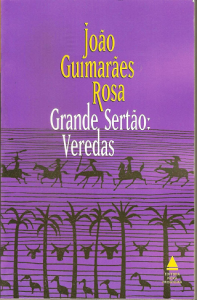 literatura é um olhar inédito e inovador para o interior do país, 600 páginas de Guimarães Rosa, além de um experimentalismo linguístico do início do modernismo (voltaremos a ele),
literatura é um olhar inédito e inovador para o interior do país, 600 páginas de Guimarães Rosa, além de um experimentalismo linguístico do início do modernismo (voltaremos a ele),
O livro Grande Sertão: Veredas, tem algo de filosofia e mistério pois chega a “anunciar” a própria morte, fala da travessia simbólica do rio e do sertão de Riobaldo, um amor curioso e inexplicável por Diadorim, onde se confunde beleza e medo, há um ser e um não-ser, a convivência de verdade e mentira, parece haver um pacto entre linguagem e poesia.
Um ex-jagunço é o personagem narrador do livro, aqui já uma novidade porque deixa o personagem falar, Riobaldo conhecido pelas alcunhas Tatarana ou Urutu-Branco, e ele vai falando quase num discurso oral, sobre coisas populares, tais como:
– o diabo existe ou não … e vai dizendo (…) Bem, o diabo regula seu estado preto, nas criaturas, nas mulheres, nos homens, até nas crianças – eu digo. (…) E nos usos, nas plantas, nas águas, na terra, no vento… Estrumes… O diabo na rua, no meio do redemunho… (Rosa, 2001, p. 26).
– vai fazendo um enredo sobre pessoas boas também: “O senhor ache e não ache. Tudo é e não é… Quase todo mais grave criminoso feroz, sempre é muito bom marido, bom filho, bom pai, e é bom amigo-de-seus-amigos! Sei desses. Só que tem os depois – e Deus, junto. Vi muitas nuvens” (Rosa, 2001, p. 27).
– mas vê pouca distância em tudo: “De sorte que carece de se escolher: ou a gente se tece de viver no safado comum, ou cuida de só religião só. Eu podia ser: padre sacerdote, se não chefe de jagunços; para outras coisas não fui parido.” (Rosa, 2001, p. 31).
– Mostra os paradoxos entre bem e mal: ”Querer o bem com demais força, de incerto jeito, pode já estar sendo se querendo o mal, por principiar. Esses homens! Todos puxavam o mundo para si, para o concertar consertado. Mas cada um só vê e entende as coisas dum seu modo.” (Rosa, 2001, p. 33).
– sua amizade e relação com Diadorim: “Diadorim e eu, nós dois. A gente dava passeios.Com assim, a gente se diferenciava dos outros – porque jagunço não é muito de conversa continuada nem de amizades estreitas: a bem eles se misturam e desmisturam, de acaso, mas cada um é feito um por si.” (Rosa, 2001, p. 45)
Atravessar o rio, ser e não-ser e estar sempre num amor desapegado, dia 18 de abril de 2016.
Estética imposta e ser no Brasil
A análise de Martim Vasques da Cunha é importante até que resolve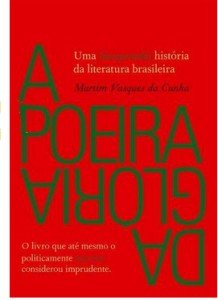 abrir um discurso Kierkegaardiano em torno de três princípios, que não é exatamente o discurso do pensador dinamarquês, mas faz sentido: o belo, o bom e o verdadeiro.
abrir um discurso Kierkegaardiano em torno de três princípios, que não é exatamente o discurso do pensador dinamarquês, mas faz sentido: o belo, o bom e o verdadeiro.
Kierkegaard junto a Niestzche e Schopenhauer são sem dúvida uma ruptura com o discurso do “monismo da razão” termo usado por Cunha, mas que provavelmente de propósito quer colocar Espinoza e Leibniz de quem se pode falar de monismo, com Descartes e Kant estes sim elaboradores do racionalismo.
O importante é que Cunha ao afirmar que “no Brasil, a vida por meio de um ponto de vista meramente estético é o que caracteriza o comportamento de seu cidadão” (Cunha, 2015, p. 96) e mais a frente vai indicar “que o Belo não precisa do Bom nem muito menos do verdadeiro, e lhe interessa é a aparência, o disfarce, a dissimulação …” (idem).
Retoma um discurso de Viera de Mello, este sim correto: “na verdade é a compreensão do mundo como um palco que leva o brasileiro a uma exteriorização excessiva dos seus sentimentos, exteriorização que, muitas vezes, não é possível levar a efeito sem uma certa insinceridade. ” (apud Cunha, 2015, p. 77).
É verdade, mas devemos reconhecer que tomamos isto de certa forma “emprestado” dos negros e não dos europeus que vieram aqui, portanto o restante do discurso de Kieerkegaard vale para o europeu, próprio do discurso de Cunha e não da mistura brasileira.
A mistura de raças que fazem a mistura do brasileiro somada aos índios, contribuíram para uma dificuldade de identidade que exige do brasileiro esta exposição de exterioridade, desejo de dialogia, ao mesmo tempo em que mergulha na busca do bom e do justo (no sentido social mais amplo que se possa pensar), algo que fez Policarpo Quaresma escrever um requerimento “à Câmara dos Deputados do Governo Federal ao pedir que a língua oficial da nação fosse o tupi-guarani e não o português …” (apud Cunha, 2015, p. 85).
É preciso espaço e diálogo para que a expressão da brasilidade se desenvolva, ainda não sabemos quem somos, quando soubermos veremos que é uma bela e boa diversidade, cada qual com suas verdades culturais.
Softwares de redes lutam por privacidade
Espera um desfecho da luta da Apple contra o governo americano que quer a liberação do software que mantém os dados sigilosos desta empresa, a Apple é uma empresa privada que mantém seu software e conteúdos privativos, para dizer algo sobre a “privacidade”.
a liberação do software que mantém os dados sigilosos desta empresa, a Apple é uma empresa privada que mantém seu software e conteúdos privativos, para dizer algo sobre a “privacidade”.
Creio que vai demorar, então o recurso que a maçã apresentou em fevereiro a um tribunal para que desbloqueasse um telefone para o FBI de um dos autores do tiroteio de dezembro de 2015 na cidade californiana de San Bernardino (deixou lá 14 mortos e 22 feridos) ainda seguem na justiça americana e não sabemos onde irá parar.
Para a empresa da maçã mordida, as repercussões causariam “um prejuízo significativo às liberdades civis, à sociedade e à segurança nacional”, conforme notícia do The Guardian.
Também segundo o tablóide inglês nas próximas semanas o Whatsapp planeja expandir seus sistemas de codificação de modo que também suas mensagens de voz estejam encriptadas, tanto quanto as mensagens em grupos, também o Facebook deverá lançar ferramentas em breve, enquanto Snapchat e Google trabalham nesta direção.
Segundo especialistas em empresas líderes do Vale do Silício, sobre a questão da privacidade, no momento em que a Apple trava a batalha legal com o Departamento de Justiça dos Estados Unidos, as outras empresas vão no vácuo desta batalha.
Ainda o jornal inglês informa que os projetos dessas companhias indicam que o setor está disposto a apoiar publicamente a Apple com ações concretas contra as exigências do governo americano, então a luta ficará aberta
Tudo é obvio, se souber
Duncan J. Watts é autor conhecido de redes devido seu trabalho sobre como as 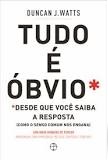 redes funcionam, num aspecto essencial que é os seis graus de liberdade, segundo o qual através de seis graus de conexão, estamos ligados a todos, dependendo é claro da inserção em alguma rede, há aqueles invisíveis que não são vistos por nenhuma rede.
redes funcionam, num aspecto essencial que é os seis graus de liberdade, segundo o qual através de seis graus de conexão, estamos ligados a todos, dependendo é claro da inserção em alguma rede, há aqueles invisíveis que não são vistos por nenhuma rede.
Seu livro Tudo é Óbvio, desde que você saiba a resposta (como o senso comum nos engana), dá pistas para uma nova maneira de pensar, publicado em 2011 teve uma tradução da Paz e Terra no ano de 2015, explica os equívocos sobre o futuro.
Explica que a racionalização contemporânea é benéfica, mas pode levar a equívocos: “A crença implícita de que as pessoas são racionais até que se prove o contrário é uma crença otimista, até mesmo sensata que deve ser encorajada.” (WATTS, 2015, p. 47)
O problema básico é quando queremos passar isto a pessoas: “Contudo, o exercício de racionalizar o comportamento ofusca uma importante diferença entre aquilo que queremos dizer quando falamos sobre “compreender” o comportamento humano, em oposição ao comportamento de elétrons, proteínas ou planetas.” (WATTS, 2015, p. 47)
E esclarece que o ser numa rede, não pode ser confundido com estes elétrons ou proteínas: “Mas em nenhum se espera compreender como é ser um elétron – sem dúvida, até mesmo a noção de tal expectativa é risível.” (WATTS, 2015, p. 48)
É aí que a as mídias de redes (que são tecnologias) podem afetar as pessoas (que estão conectadas através das mídias).
WATTS, Duncan. Tudo é óbvio – desde que você saiba a resposta. Rio de Janeiro. Paz e Terra, 2015
Redes Sociais: o outro, as fronteiras e o futuro
Em programa na rádio USP, 93.7 MHz (com link na Web) neste sábado (06/02) ás 14 h. no programa Diversidade em Ciência, apresentado pelo Dr. Ricardo Alexino Ferreira, com o tema: “REDES SOCIAIS, COMUNIDADES, REFUGIADOS E DESAPARECIMENTO DE FRONTEIRAS” temas que trabalho em minhas aulas e mostro as conexões com minha espiritualidae.
ás 14 h. no programa Diversidade em Ciência, apresentado pelo Dr. Ricardo Alexino Ferreira, com o tema: “REDES SOCIAIS, COMUNIDADES, REFUGIADOS E DESAPARECIMENTO DE FRONTEIRAS” temas que trabalho em minhas aulas e mostro as conexões com minha espiritualidae.
O primeiro bloco falamos de invisibilidade, da multidão sem rosto e sem direitos, apresentamos a música “Oltre l’invisibile” do conjunto Gen Rosso italiano.
Depois falamos das redes sociais, da inclusão do outro, de laços francos e seis graus de separação que são fenômenos de Redes Sociais, a música apresentada é Il Pellicano do Gen Verdi, versão feminina do Gen Rosso.
Falamos também da queda de barreiras, dos problemas dos emigrantes, da Síria e da questão islâmica, é apresentada a música islâmica Surat Vaca, com tradução para o português.
Aspectos das questões sociais das Américas, é apresentada com a música “America, America” para ilustrar este tema.
Finalizamos apresentando as questões sociais, como as redes estão inseridas neste contexto e a música do Gen Rosso Streetlight.

